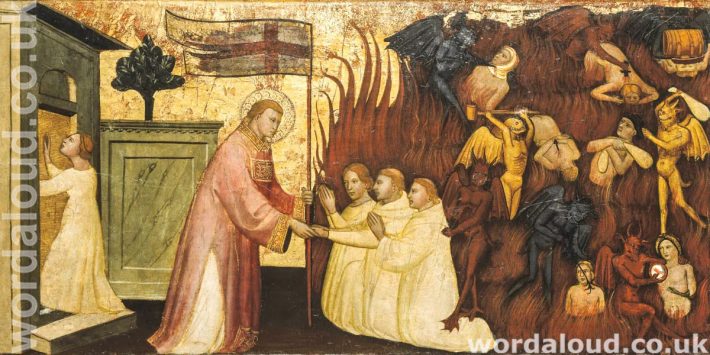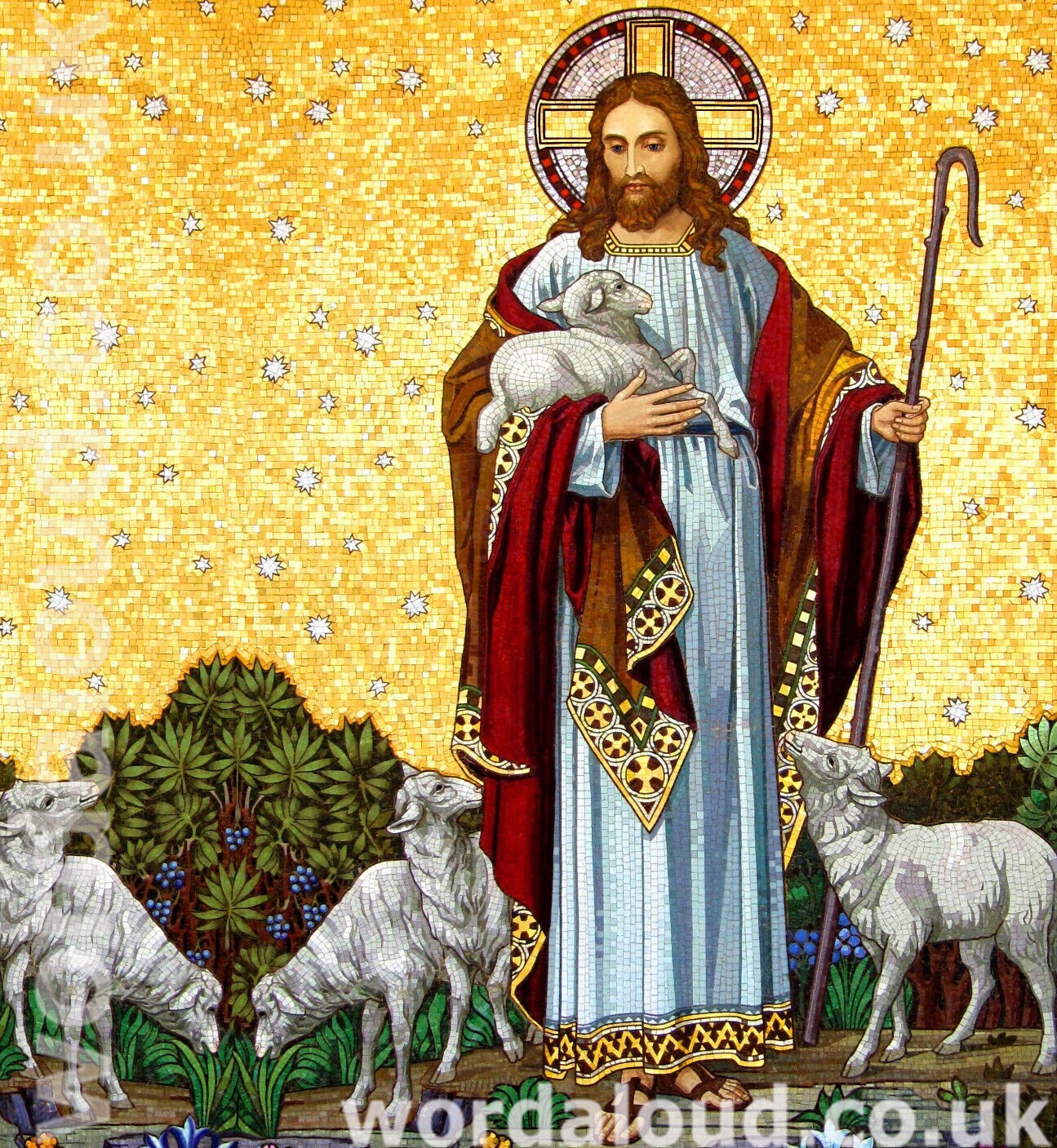Christian Art | Visions Of Purgatory | Love Revealed By Jesus Christ
Office Of Readings | Week 33, Wednesday, Ordinary Time | A Reading From The Sermons Of Saint Augustine | The Heart Of The Righteous Will Rejoice In The Lord
‘The Heart Of The Righteous Will Rejoice In The Lord.’
Saint Augustine reflects on the joy of the just, a joy rooted not in worldly circumstances but in God himself. He takes as his starting point the psalm’s declaration that ‘the just man will rejoice in the Lord’, and he invites the Christian to recognise this as both a present reality and a future promise. Joy in God is, for Augustine, a mark of the just because it springs from faith and hope—virtues that draw the soul beyond what it sees to what it awaits.
Augustine acknowledges a tension that defines Christian life: we are called to rejoice in the Lord, yet we do not yet see him. This is not a contradiction but the very form of the Christian journey. As long as we live in the body, we ‘walk by faith, not by sight’. The fullness of joy will come only when the promise of seeing God ‘as he is’ is fulfilled. But already, Augustine insists, there is joy in the very possession of this hope. Hope itself is a gift that grounds our rejoicing, for it is the pledge of a future vision that cannot fail.
He emphasises that this hope is not empty. The Christian already possesses ‘the first fruits of the Spirit’—the beginnings of God’s presence and work within the soul. These first fruits are not the banquet itself, but they are its foretaste. They kindle in the heart a desire for what is to come and a delight in what is already given. In this way, Augustine helps us to understand Christian joy as something that grows from both promise and experience: the promise of seeing God, and the experience of God’s nearness even now.
But this nearness, Augustine says, is something we can either welcome or resist. The Lord does not withdraw from us arbitrarily; he draws near wherever he finds love. The repeated exhortation ‘love, and he will draw near’ shows Augustine’s conviction that love is both the condition and the fruit of God’s indwelling. Since ‘God is love’, he enters the heart that loves him and transforms it from within. The distance between God and the soul is therefore not spatial but moral and spiritual: God is far only when love is absent.
Finally, Augustine turns the believer’s attention to the goodness of God, the source of all that delights us. If we delight in created goods, how much more should we delight in the Creator who gives them? God alone is the inexhaustible good, the One who gives without diminishing, the One whose presence is joy in its fullness. To rejoice in him now is already to begin to taste the happiness for which we were made.

A Reading From The Sermons Of Saint Augustine | The Heart Of The Righteous Will Rejoice In The Lord
The just man will rejoice in the Lord and put his hope in him; the hearts of all good men will be filled with joy. We must surely have sung these words with our hearts as well as with our voices. Indeed, the tongue of the Christian expresses his deepest feelings when it addresses such words to God. The just man will rejoice, not in the world, but in the Lord. Light has dawned for the just, Scripture says in another place, and joy for the upright of heart. Were you wondering what reason he has for joy? Here you are told: The just man will rejoice in the Lord. Another text runs: Delight in the Lord, and he will give you your heart’s desires.
What are we instructed to do then, and what are we enabled to do? To rejoice in the Lord. But who can rejoice in something he does not see? Am I suggesting that we see the Lord then? No, but we have been promised that we shall see him. Now, as long as we are in the body, we walk by faith, for we are absent from the Lord. We walk by faith, and not by sight. When will it be by sight? Beloved, says John, we are now the sons of God; what we shall be has not yet been revealed, but we know that when it is revealed we shall be like him, because we shall see him as he is. When this prophecy is fulfilled, then it will be by sight.
That will be the great joy, the supreme joy, joy in all its fullness. Then we shall no longer drink the milk of hope, but we shall feed on the reality itself. Nevertheless, even now, before that vision comes to us, or before we come to that vision, let us rejoice in the Lord; for it is no small reason for rejoicing to have a hope that will some day be fulfilled.
Therefore, since the hope we now have inspires love, the just man rejoices, Scripture says, in the Lord; but because he does not yet see, it immediately goes on to say, and hopes in him.
Yet already we have the first fruits of the Spirit, and have we not also other reasons for rejoicing? For we are drawing near to the one we love, and not only are we drawing near – we even have some slight feeling and taste of the banquet we shall one day eagerly eat and drink.
But how can we rejoice in the Lord if he is far from us? Pray God he may not be far. If he is, that is your doing. Love, and he will draw near; love, and he will dwell within you. The Lord is at hand; have no anxiety. Are you puzzled to know how it is that he will be with you if you love? God is love.
‘What do you mean by love?’ you will ask me. It is that which enables us to be loving. What do we love? A good that words cannot describe, a good that is for ever giving, a good that is the Creator of all good. Delight in him from whom you have received everything that delights you. But in that I do not include sin, for sin is the one thing that you do not receive from him. With that one exception, everything you have comes from him.
Christian Prayer With Jesus
Lord God,
source of all joy and giver of every good thing,
you have placed within our hearts a hope that does not deceive:
the promise that one day we shall see you as you are
and rejoice in your presence without end.
Grant us, we pray, to rejoice in you even now—
not in passing comforts, nor in the works of our own hands,
but in your steadfast love that draws near to all who seek you.
Remove from us whatever dims the light of your presence:
sin, fear, anxiety, and the love of lesser things.
Kindle in us that charity by which you dwell within us,
and give us the grace to love you above all
and to delight in the gifts that come from you
with hearts set always on the Giver.
May the first fruits of your Spirit sustain us on the way,
until the day when faith becomes sight
and our joy is made perfect in your glory.
Through Christ our Lord.
Amen.
Glossary Of Christian Terms
The Just / The Righteous
Those who live in right relationship with God through faith, obedience, and charity. In Augustine’s usage, their righteousness comes from God’s grace, not their own merit.
Rejoice in the Lord
A biblical expression meaning to find one’s joy, security, and delight in God rather than in worldly circumstances.
Hope
One of the theological virtues. It is the confident expectation of God’s promises—especially eternal life and the vision of God.
Walk by faith, not by sight
A phrase from Saint Paul (2 Corinthians 5:7) indicating that in this life Christians live by trust in God, not by direct vision of him.
Beatific Vision
The final and perfect seeing of God ‘as he is,’ promised to the blessed in heaven. Augustine refers to this as the future fullness of joy.
First fruits of the Spirit
The initial workings of the Holy Spirit in the soul—grace, conversion, desire for God, and the beginnings of holiness—seen as a pledge of the glory to come.
Indwelling of God
The presence of God within the soul through love and grace. Augustine emphasises that God dwells where love is found.
God is Love
A scriptural affirmation (1 John 4:8) often cited by Augustine to explain that love is both God’s nature and the means by which he unites himself to the soul.
Sin
Whatever turns the heart away from God. Augustine notes that sin alone is not a gift from God and is the one thing that cannot bring true delight.
Delight in the Lord
To find contentment and joy in God above all things, trusting that he will fulfil the desires he himself places in the heart.








